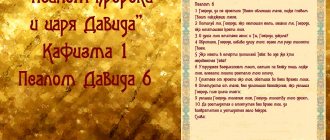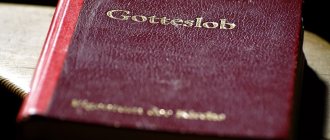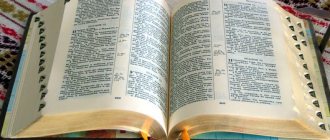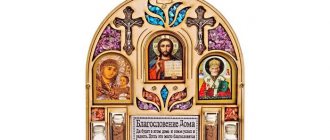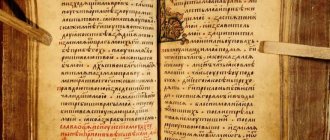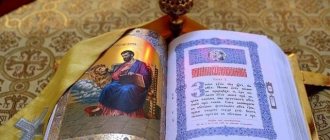In the book of Psalms, each chapter is unique. This is a separate poetic work, filled with deep philosophical and religious meaning. Psalm 126 is part of a whole galaxy (from 119 to 133), united by a common theme - they are called songs of ascension. Many composers have written music to this text, although it is quite short and contains only five lines. In what cases is this biblical chapter read, what thoughts did the author want to share? Find out from the article.
About the author About the book
Prayer
- Unless the Lord builds a house, those who build it labor in vain; unless the Lord preserves the city, it builds in vain.
- It is in vain for you to exercise in vain: you will rise up when you are gray, eating the bread of sickness, when you have given sleep to your loved ones.
- Behold, the son's heritage of the Lord, the reward of the fruit of the womb.
- Like arrows in the hand of a strong man, like sons shaken off.
- Blessed is he who gets his desire from them: they will not be ashamed when they speak to their enemies in the gates.
In Russian
Reading rules
There are no specific rules for reading the Psalter, but there are several recommendations that it is advisable to follow.
- In church the psalm is read in Church Slavonic; at home you can read it in Russian, in front of an icon and a burning candle. God hears the thoughts of the righteous, so it is not necessary to read the prayer out loud.
- Also, Psalm 126 should not be addressed if the meaning of the words is not clear. It should be close to the heart and sound sincere. Only in this way will the Lord hear it and fulfill it.
If a child does not appear in a family, then it is God’s will. Descendants become for their parents what they are supposed to be - a joy or a cross.
Solomon, despite the laws, multiplied the number of his wives, but he had only one son. This is explained by the fact that anyone who wants to have descendants as an inheritance from God must accept the path required by the Lord.
And God’s law states that the addition of a family should occur only in a legal marriage with a single wife. Children are an inheritance from the Savior and a reward and should be treated as such.
Prayer
- If the Lord does not build the house, those who build it labor in vain; If the Lord does not guard the city, the watchman watches in vain.
- It is in vain that you rise early, sit up late, eat the bread of sorrow, while He gives sleep to His beloved.
- This is the inheritance from the Lord: children; the reward from Him is the fruit of the womb.
- Like arrows in the hand of a mighty man, so are young sons.
- Blessed is the man who fills his quiver with them! They will not be left in shame when they speak to their enemies at the gates.
When to read Psalm 126?
Psalm 126 is always relevant. It is considered permanent and is recommended for regular reading, as it draws attention to God's important gift - children. The psalm is read with thanksgiving and praise. It can also be used when you need to ask the Lord for blessings in all matters.
Any prayer can strengthen faith and heal the soul, and Psalm 126 can also promote good luck.
The Lord is protection in all situations, but only when one sincerely believes and hopes in Him. The Savior will never refuse help and will not allow the righteous to stray from the right path.
History of writing
The chant is one of the fifteen called "Songs of Degrees" or "Songs of Ascension."
Useful materials
There are different opinions about whether they were written by Jews during the Babylonian captivity or after it. Many of these psalms may have appeared centuries earlier, and were preserved by believers until the time of the captivity. Among these, apparently, also belongs the 126th, which Jewish tradition has long attributed to King Solomon, the son of the great David. The chant is dedicated to the magnificent Jerusalem Temple, which was built during his reign.
Jerusalem Temple
But this same temple was destroyed by the Babylonian king Nebuchadnezzar in 586 BC, and began to be restored only after 70 years of captivity of the Jews. With bitterness, repentance, but also hope for God’s mercy, the builders then said: “If the Lord does not build the house, those who build it will labor in vain...”
Historical information
If this is not your first time encountering this topic, then of course you know that the author of most texts from the Psalter is King David. But in this case his son, Solomon, is indicated. However, many researchers are inclined to think that he was only the addressee to whom the psalmist’s thoughts turned. Moreover, in the second part of the work we are talking about the fact that a father can be proud of his young sons.
Psalm 126 has a fairly clear general meaning, which is already included in the first lines:
- any business that people begin will be in vain if God does not bless it;
- children, especially sons, are not only a source of pride, but also a reward from the heavenly Lord;
- when the time of testing comes, those who have been faithful to the Lord will be able to easily defend themselves from their enemies.
Work as a courier at Yandex.Eda (up to 3,400 rubles per shift) leave a request →
The Greek translation from which the Church Slavonic was made is distinguished by a number of inaccuracies. For example, the fourth line talks about sons born in youth (and not sons expelled).
Interpretation of the prayer
Traditionally, the holy fathers and other interpreters understand the psalm both historically and in many ways, spiritually, even prophetically.
With God and without God
The first verses of the chant are most often interpreted historically. Here it goes:
- about the construction of the temple under Solomon, its restoration under the priest Zerubbabel, about the fact that such a great work is impossible without God’s blessing;
- the words “unless the Lord preserves the city...” also mean the difficulties of the Jews who were re-building not only the temple, but the entire devastated Jerusalem: they encountered many obstacles, attacks from enemies dissatisfied with their return, so that along with the construction they also had to defend themselves; however, this is also impossible without God's blessing.
Interesting fact
Many interpreters (St. Theodore the Studite, Ambrose of Optina) also say that the first two verses of the psalm depict not only the temple of Jerusalem, but also the “house of the human soul,” the virtues of which cannot be acquired through one’s own efforts.
And Archpriest Sergius Ternovsky, theologian of the 19th century. (1800-1868) says that these two verses generally show the state of a person trying to “settle” in this world on his own:
“In this state there are people obsessed with self-interest and ambition: they do not give themselves rest; They get up very early, work on their work and, as soon as they sit down to rest, they quickly get up again because, according to their selfish and ambitious views, they need to give an answer to one, an order to another, instruction to another, or a greeting. Burdened with countless worries, they do not even eat bread for sweetness, but this is either because from excessive stinginess they are depriving themselves of good and healthy food, or because even good food becomes bitter for them from the consuming worries that torment their soul.”
This “bread of sickness” is the opposite of the rest that the psalmist describes with the words “when He gives His beloved sleep.” According to St. Ambrose of Optina, here we are talking specifically about calmness, which is possible only with the confidence that the matter has God’s blessing. Then, according to the word, St. Ambrose, the Lord will give the opportunity not only to rebuild the temple, the city, but here sons will be born to the returning Jews, and their lives will pass under the shelter of the Creator.
"Sons of the Shocked"
The fourth verse of the psalm, which mentions “the sons of the shaken”, likened to weapons, the arrows of a strong warrior, is not always easy to understand. “Shocked” means:
- historically - Jews expelled from their homeland, who were promised not only return, but restoration of their former honor in the eyes of God and people; such was the great hope of those who returned from captivity;
- we can also talk about the times of the coming of the Messiah, when the Jews who rejected the Lord will be called “shaken”, and their “sons” will be the disciples of Christ, who, despite the hatred of their fellow tribesmen, led many peoples to faith; This is exactly how St. understands this place. Athanasius the Great, and after him St. Ambrose Optinsky.
- There is also a modern interpretation of these words:
Archpriest Oleg Stenyaev, in a conversation on the psalm on the Exeget portal on January 30, 2022, says that these words of the psalm can be applied to Russian reality: the reward of those who suffered for their faith during godless persecutions, who are now called new martyrs and confessors, “there will be strong offspring precisely in the spiritual sense.”
The last verse of the psalm says that those who win will not be ashamed and will triumph over their enemies. This can be understood as hope for the builders of the temple and the city, and also as a prophecy about the future triumph of Christ.
Words of hope in God, confidence that only with His blessing is true success possible, and most importantly - calmness, peace of soul - this is the content of the chant, which teaches us not to try to build our lives without help from above, to trust the Creator.
Author Natalya Sazonova
Psalm 134
The collection of Psalms has several parts. The small hallel part ends with the prayer Psalm 134. These are religious hymns that end with the word “hallelujah.” The text of Psalm 134 is the connecting part of prayers 133 and 135. Songs of praise are aimed at praising the Lord, to be grateful to him from day to day.
Text of prayer Psalm 134
The song is sung in churches in Church Slavonic, but you can read Psalm 134 in Russian.
In Church Slavonic with accents
1 Praise the name of the Lord, praise, servants of the Lord,
2 Standing in the temple of the Lord, in the courtyard of the house of our God.
3 Praise the Lord, for the Lord is good, sing praise to His name, for it is good:
4 Because the Lord has chosen Jacob for His own possession, Israel.
5 For I have known that the Great Lord is, and our Lord is above all gods.
6 Whatever the Lord pleases, create in the heavens and on the earth, in the seas and in all the deeps.
7 Bringing up clouds from the last of the earth, making lightning into rain, bringing up winds from your treasures.
8 And smite the firstborn of Egypt, from man to beast.
9 I sent signs and wonders in the midst of you, Egypt, against Pharaoh and against all his servants.
10 And smite the tongues of many, and slay the mighty kings:
11 Zion king of the Amorites, and Og king of Bashan, and all the kingdom of Canaan,
12 And I will give the land their inheritance, an inheritance to Israel for His people.
13 Lord, Your name endures forever, and Your memory endures forever:
We recommend studying Evening Prayers
14 For the Lord will judge his people, and will pray for his servants.
15 Idols are a tongue, silver and gold, the work of human hands.
16 They have lips and do not restrain; they have eyes and do not see,
17 They have ears and will not hear, for there is spirit in their mouth.
18 Let those who do things, and all those who trust in her, be like them.
19 To the house of Israel, bless the Lord; to the house of Aaron, bless the Lord; to the house of Levi, bless the Lord.
20 You who fear the Lord, bless the Lord.
21 Blessed is the Lord from Zion, who lives in Jerusalem.
In Russian
1 Praise the name of the Lord, praise ye servants of the Lord,
2 standing in the house of the Lord, in the courts of the house of our God.
3 Praise the Lord, for the Lord is good; sing to His name, for it is sweet,
4 For the Lord has chosen Jacob for himself, Israel for his own.
5 I knew that the Lord is great, and our Lord is above all gods.
6 The Lord does whatever he wants, in heaven and on earth, on the seas and in all the deeps;
7 He raises up the clouds from the ends of the earth, He makes lightning in the rain, He brings out the wind from His storehouses.
8 He smote the firstborn of Egypt, from man to beast,
9 He sent signs and wonders among you, O Egypt, against Pharaoh and against all his servants,
10 He smote many nations and destroyed mighty kings:
11 Sihon king of the Amorites, and Og king of Bashan, and all the kingdoms of Canaan;
12 And he gave their land for an inheritance, for an inheritance to Israel his people.
3 Lord! Your name endures forever; God! memory of You to generation and generation.
14 For the Lord will judge His people and have mercy on His servants.
15 The idols of the heathen are silver and gold, the work of human hands:
16 They have a mouth, but they do not speak; They have eyes, but they do not see; Yours.
17 They have ears, but they hear not, and there is no breath in their mouth.
18 Those who make them and everyone who trusts in them will be like them.
19 House of Israel! bless the Lord. House of Aaron! bless the Lord.
20 House of Levi! bless the Lord. Those who fear the Lord! bless the Lord.
21 Blessed is the Lord from Zion, who dwells in Jerusalem! Hallelujah!
History of writing
The song of praise is believed to have been written during the restoration of the Second Temple of Jerusalem
This is an important event for the entire Jewish people
- Verses 1-4: Praise the Lord at every opportunity. The author encourages everyone to sing psalmody. The people of Israel are called to praise the Almighty.
- Verses 5-8: The Lord is great on sea and on land. God's power is great, it can mix fire and water. If there is no faith or it is weak, then the Lord may not hear prayers and may not respond to suffering. He is above all Jews.
- Verses 9-12: The story of the creation of Israel sounds, all its ups and downs, wars and joys.
- Verses 13-14: Prophecies are spoken that tell of the power of the Most High.
- Verses 15-18: The author describes the uselessness of other gods. After all, they are created in human likeness.
- Verses 19-21: The singer once again calls on the people of Israel and the rest of the people to praise the works of the Lord.
